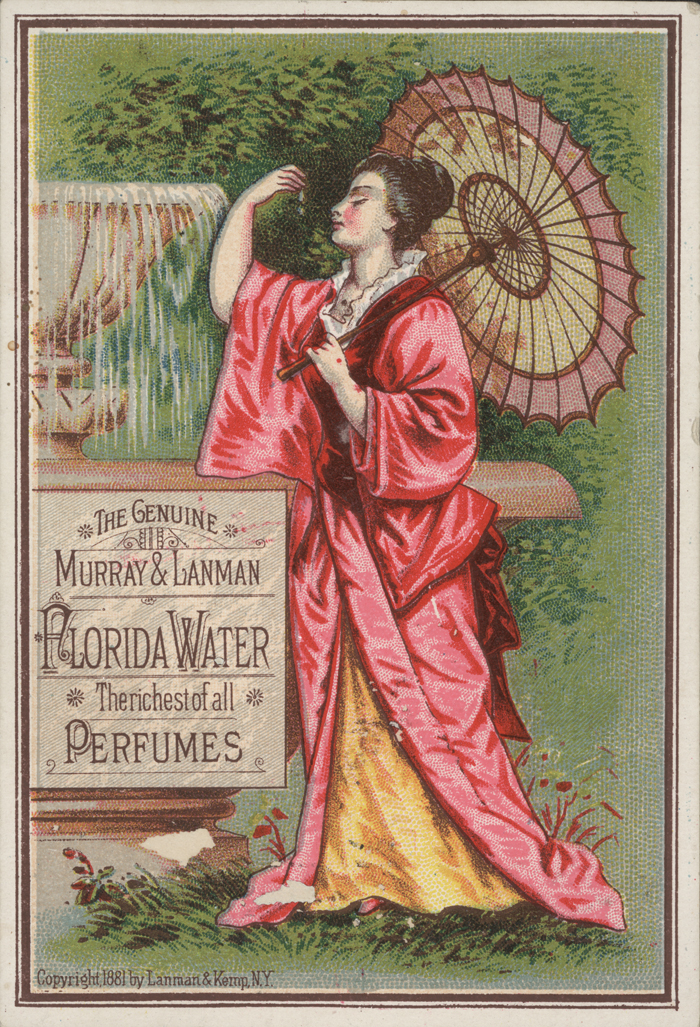Isaac White, Trinidad, 1907
Isaac White’s prosecution reveals many common strategies of both prosecutors and defense lawyers in obeah cases in early twentieth century Trinidad, and is also interesting because the court heard considerable details about White’s ritual practices. It is one of many cases where the ritual specialist was asked to influence the outcome of a court case. White was charged with obeah for his efforts to help Jack (Jacob) Brown, who claimed to be facing prosecution for selling rum without a license. Brown visited White at his house in San Juan, east of Port of Spain. White asked him for five shillings and an egg to help him interpret the situation.

An advertisement for Florida Water from 1881, by Lanman & Kemp, New York (Scan of original trade card) [Public domain], via Wikimedia Commons
When Brown returned to White’s house on Friday evening, White proposed to give Brown a ritual bath. White told him to give him the cock, and then turn to the east and to say his Belief three times. He asked him the name of the constable in the case. When Brown had told him the name, White opened the Florida water, sprinkled some over the cock and spit some into the cock’s mouth. He said ‘I am going to work the case by seven stars’, and then promised Brown that his case would be decided by a magistrate rather than go to a judge’s court.
Brown was just about to begin the ritual bath when there was a knock at the door. Four policemen were on the doorstep, with a warrant to search for ‘implements used in the practice of obeah.’ After searching, they arrested Isaac White, and removed from his house many objects which they later claimed in court were connected to the practice of obeah: ‘a bundle of letters, a pitch oil tin and three small tins containing some sort of liquid; six bottles, a few of which contained liquid, three flasks, some also containing liquid, candles, stones, etc.’ As was common in obeah cases, many of these objects would have been found in many Caribbean homes at that time.
Brown, it turned out, was a police informant, and had acted as a police spy on multiple occasions over the last thirty years. Between his first and second visit to White, he had informed the police of what was going on. This enabled them to get the warrant and appear at White’s door at the correct moment.
At his trial White was defended by the lawyer Gaston Johnson, who also defended many others charged with obeah in Trinidad in this period. Johnston argued that there was no supernatural aspect to White’s practice, and suggested that his actions were merely equivalent to the practice of taking ‘bush medicine’ (folk medicine) in the form of herbal teas.
Johnston challenged one of the police officers, Sergeant Eversley, on this point. Eversley replied that he had never taken ‘bush medicines made by this class of people’, but under further questioning admitted that that ‘he would take bush medicine if prescribed by a doctor, and that he also ate watercress, which is cooling and healthy, and good for the kidneys.’ Johnston used this answer to expose Eversley’s racism and class prejudice: ‘See how prejudiced you are – ‘this class of people’.’ He also claimed that there were technical problems with the warrant, and that the case as a whole was a ‘conspiracy’ between Eversley and Brown, ‘a known criminal’.
These points made some impression on the Magistrate, who condemned police methods in his judgement. Even so, he convicted White, and sentenced him to one month’s hard labour in prison. White appealed, but lost the case.
Sources
Port of Spain Gazette, 22 Oct 1907, p. 5, 13 November, 29 November and 20 February 1908
Lanman & Kemp-Barclay & Co., Inc , http://www.lanman-and-kemp.com/history.htm
Isaac White at Caribbean Religious Trials
